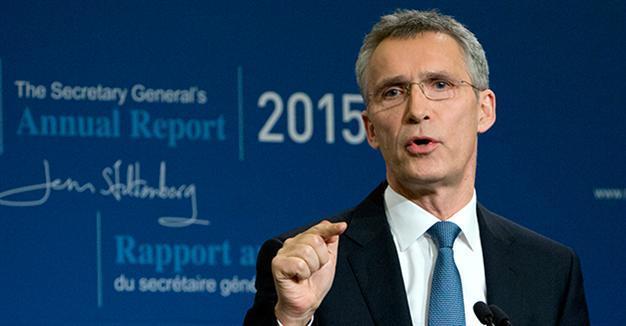NATO says Russian air strikes ‘undermining’ Syria peace efforts
AMSTERDAM - Agence France-Presse

AP Photo
NATO head Jens Stoltenberg said Feb. 5 that Russia’s air strikes in Syria targeting rebel forces are “undermining” efforts to find a peaceful solution to the five-year war.Syrian peace talks in Geneva earlier this week broke up acrimoniously as Moscow’s long-time ally President Bashar al-Assad launched a fresh offensive against rebel forces in Aleppo with massive Russian backing.
“What we have seen is that the intense Russian air strikes mainly targeting opposition groups in Syria are undermining the efforts to find a political solution to the conflict,” Stoltenberg said as he arrived for talks in Amsterdam with EU defense and foreign ministers, to which Turkish Foreign Minister Mevlüt Çavuşoğlu also attended.
The NATO chief also criticized Russia’s military build-up in Syria and in the eastern Mediterranean as stoking regional tensions, especially with key alliance member Turkey.
“This creates risks and heightens tensions and is of course a challenge for NATO,” he said.
Turkey shot down a Russian fighter jet along its Syrian border in late November 2015 due to airspace violation and the two sides have been engaged in a bitter war of words ever since.
With the Syrian peace talks put on ice until Feb. 25, the U.N. Security Council was due to take up the crisis later on Feb. 5 in hopes of getting the latest peace initiative back on track.
The UN’s Syria envoy, Staffan de Mistura, said Feb. 5 he was looking for confirmation that key international players were willing to push ahead with peace talks after he suspended the latest attempt at negotiations in Geneva.
In an interview with the Italian daily La Repubblica de Mistura said he would meet next week in Munich with the countries that are part of an international group seeking a solution to Syria’s five-year war, in particular the United States, Russia and Iran.
“We will looking for confirmation at the defense conference in Munich on Feb. 12,” he told the paper.
On Feb. 4, U.S. Secretary of State John Kerry said he had warned Moscow to stop targeting the Syrian opposition in what he described as a “robust” phone call with Russian Foreign Minister Sergei Lavrov.
French Foreign Minister Laurent Fabius was equally critical of Russia’s role in Syria, charging Moscow with “torpedoing” the peace talks.
“There cannot be political discussions if one of the parties is engaged in assassinating the other,” Fabius said on his arrival at the talks in Amsterdam.
The conflict in Syria has cost more than 250,000 lives and displaced half the population, many of them fleeing to Europe in its biggest migrant crisis since World War II.
The main Syrian opposition group, the Higher Negotiations Committee (HNC), is unlikely to return to Geneva to take part in indirect peace talks because of Syria and Russia’s “arrogant” and “merciless” bombardment campaign, the opposition’s chief negotiator, Mohammed Alloush, said.
Alloush, who represents the powerful Army of Islam group, told The Associated Press late Feb. 4 that the opposition did not withdraw from the U.N.-sponsored proximity talks in Geneva because it “didn’t want to get blamed” for their failure - however he added that they could not return to the negotiating table while the bombing continued.
















